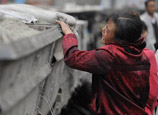
China UnionPay Co Ltd, the country's largest bank card payment processor, aims to expand the international issue of its single-branded cards, to up the ante on its main cross-border transaction rival, Visa Inc.
Over the next two to three years, the Chinese company plans to significantly increase its global footprint from the current 141 countries and regions, said UnionPay President Xu Luode.
"China UnionPay always positions itself as a modest participant and we welcome collaboration. However, Visa has been acting very aggressively," he said.
"Therefore, we need to strengthen our own capabilities to avoid such disputes," said Xu, also a national legislator from Shanghai attending the current session of the National People's Congress.
Ninety-five percent of debit cards issued by UnionPay on the Chinese mainland are single-branded, meaning that all transactions can only go through the UnionPay payment channel.
Xu said about half of credit cards are co-branded with international players such as Visa and MasterCard, but his firm will try to lower the proportion in the next few years as its own overseas network expands rapidly.
UnionPay has issued more than 16 million cards abroad, which are all single-branded cards bearing the UnionPay logo only, he said. He now expects that number to soar by between 30 and 50 percent annually over the next three years.
According to Chinese laws, foreign credit card companies need to co-brand with Chinese partners to support card services or process interbank point-of-sale transactions.
"Co-branding cards is a stopgap measure. Back then, international companies had the desire to tap into China and we relied on them to reach the overseas market.
"Now that UnionPay's network is greatly enhanced, users are free to choose their preferred payment system," Xu said.
The clash between the two rivals heightened in 2010, when Visa warned banks not to adopt the UnionPay payment system to process international transactions for co-branded Visa and UnionPay credit cards circulated in places other than the Chinese mainland.
 |
















 How we face 'getting old before getting rich'
How we face 'getting old before getting rich'


![]()
